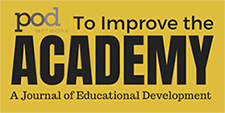Professional and Organizational Development Network in Higher Education

To Improve the Academy: A Journal of Educational Development
Date of this Version
Fall 2022
Document Type
Article
Citation
To Improve the Academy: A Journal of Educational Development (2022) 41(2)
doi: 10.3998/tia.440
Abstract
The professionalization of disciplines often leads to formalization of disciplinary training. As professionalization occurs, informal training roles are typically supplanted as the normative method of training but can continue to exist in parallel with formal methods. As in other fields, the ongoing professionalization of faculty development has created significant formalization of training. While the positive impact of formalization is clear in many areas of faculty development, little is known about how formalization affected the informal roles, activities, and perceptions that served to train faculty. This exploratory study reports on data gathered at a workshop designed to document and share stories of ongoing informal faculty development by engineering faculty. The results show that participants struggle to articulate their role in faculty development independent of the systems, programs, and individuals that make up the formalized training systems. Participants were unsure what to do, what they were allowed to do, and whether to label such work faculty development. They saw importance in informal faculty development work but seemed to feel a lack of agency to name such work as faculty development because it exists outside of the professionalized and formalized sphere of modern faculty development. The results suggest a paradox: faculty without a formal role in faculty development are still interested in aiding their peers’ growth informally but are unclear on their role without guidance from the formal system, which inherently reinforces the role of the formal system as the arbiters of faculty development.


Comments
License: CC BY-NC-ND